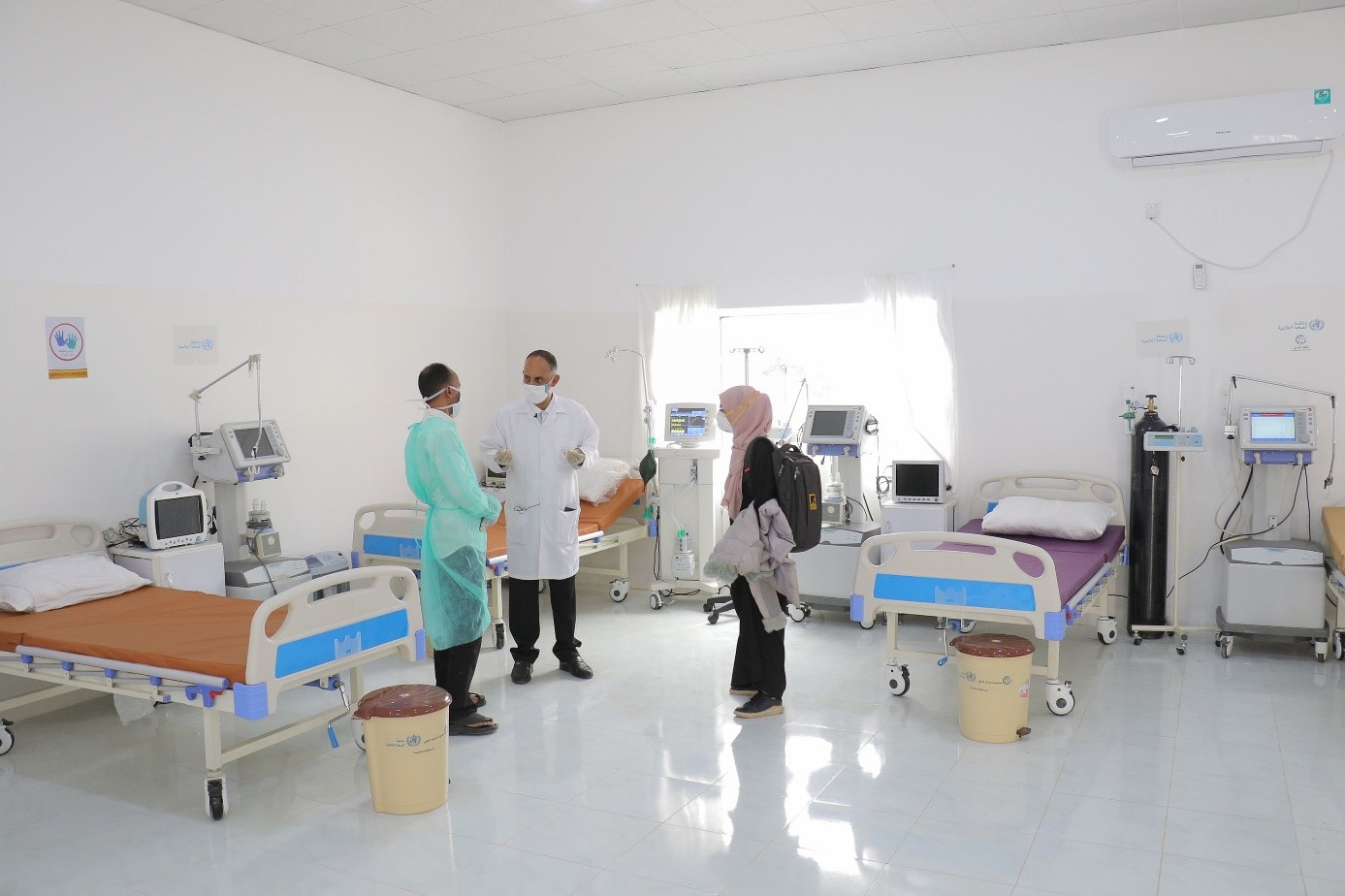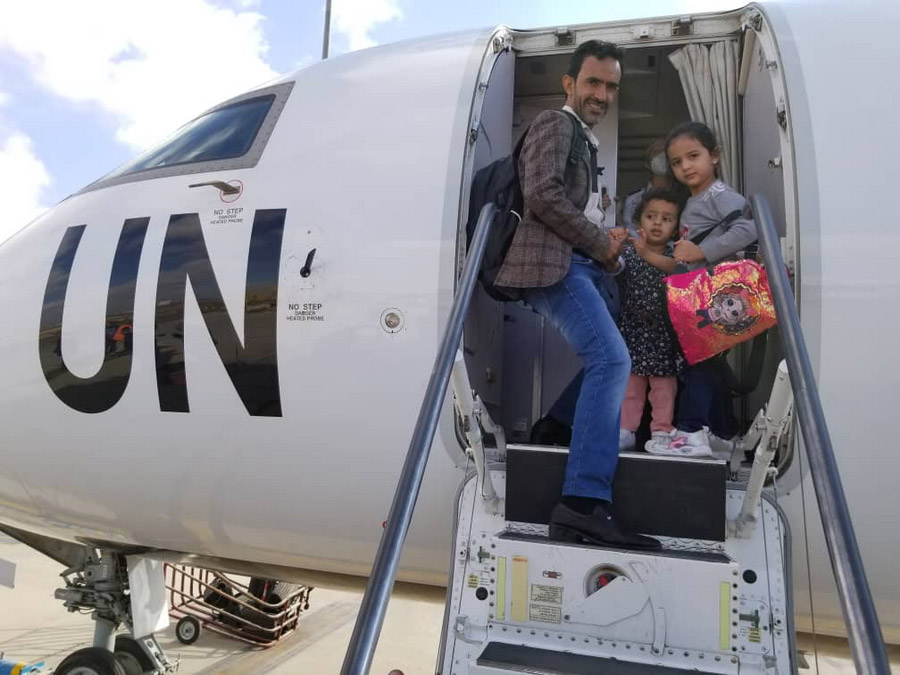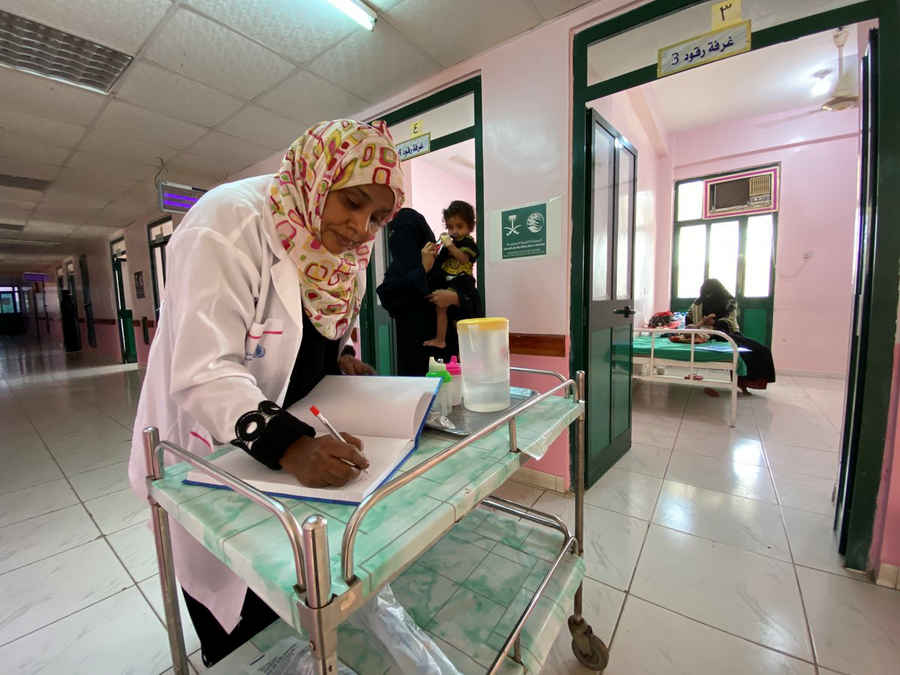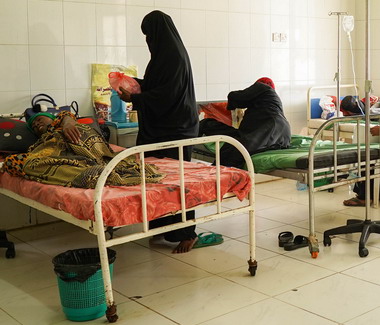Islamic Development Bank (IsDB) and WHO join forces with the Government of Yemen to respond to COVID-19

Jeddah/Geneva, 12 October 2020 – The Islamic Development Bank (IsDB) and the World Health Organization (WHO) have joined forces with Yemen’s Ministries of Health and Population and Planning and International Cooperation to provide emergency support to assist the country respond to the COVID-19 pandemic.
Built on Yemen’s national strategy to counter COVID-19, the partnership aims to reduce the occurrence and to minimize morbidity and mortality rates of COVID-19 in Yemen by strengthening the operational capacity of 32 specialized COVID-19 treatment centres and the laboratory testing capacity of 2 medical universities in the country.
Improving the preparedness of the target facilities shall comprise supporting the activation and equipping of the 32 COVID-19 treatment centres through the provision of monitoring devices for severe cases, portable pulse oximeter devices, oxygen cylinders, oxygen refilling, nebulizer devices, ultrasound, and other biomedical equipment.
Strengthening the protection of health care workers is also given high priority in the project through the provision of personal protective equipment (PPE), and expanding laboratory testing capacity via the provision of 150 000 testing kits. Essential medicines and medical supplies will also be provided to facilitate the treatment of critical COVID-19 patients.
With the start of the present pandemic, the IsDB Group allocated US $2.3 billion to counter the spread of the virus and to mitigate its economic impacts in its 57 member countries. In Yemen, the IsDB is providing a US $36.6 million COVID-19 support package, which includes US $20 million for the health sector.
The US $20 million “IsDB Group Emergency Support for the COVID-19 Preparedness and Response Project” is the first partnership between IsDB and WHO in Yemen and is part of the large-scale global response by the 2 organizations to the COVID-19 pandemic. It is also part of IsDB’s pledge of US $100 million during the virtual donors conference on Yemen, jointly hosted by Saudi Arabia and the United Nations on 2 June 2020.
The COVID-19 pandemic is amplifying Yemen’s underlying vulnerabilities as it comes on top of multiple challenges that the country is already facing including conflict, economic collapse, hunger, disease, and displacement. The combination of extreme vulnerability and low general immunity has put Yemeni population, particularly the children, at exceptional risk. Development partners are continuing to support Yemeni health authorities to respond to increasing health needs, including the COVID-19 pandemic.
Note to editors
Yemen remains the world’s largest humanitarian crisis, and WHO’s most complex operation as some 24.3 million people – 80% of the country’s population – now require humanitarian or protection assistance, with 14 million people in acute need.
More than 5 years of conflict have devastated Yemen’s health infrastructure.
Seventeen million nine hundred thousand people out of the total population of 30 million need health care services in 2020. At the same time, only half of the health facilities are fully functioning, and those that remain open lack qualified healthcare staff, essential medicines, and medical equipment like masks and gloves, as well as oxygen and other necessary supplies.
For more information, please contact:
Mr Ahmed Ben Lassoued
Team Lead, Communication
WHO Yemen country office
IsDB Communications Department
Patients return home to Yemen after medical treatment in Jordan

Sana’a, 4 October 2020 – The World Health Organization (WHO) Representative for Yemen Mr Altaf Musani, UN Humanitarian Coordinator for Yemen Ms Lise Grande, and UN Special Envoy for Yemen Mr Martin Griffiths welcomed the return today of patients who have been receiving medical care in Jordan for diseases and conditions which cannot be treated in Yemen.
“It’s wonderful to see patients coming home after receiving treatment,” said Ms Grande. “These are very special people. They were selected for the first flights of the medical airbridge in February because they were suffering from cancer, kidney disease and congenital anomalies and couldn’t get the help they needed in Yemen.”
“Because of the war, blockades and the breakdown of the health system, their only hope was to leave the country,” said Ms Grande.
WHO and the Office of the Special Envoy of the Secretary-General for Yemen facilitated the flights in collaboration with local health authorities. The UN is grateful to the Yemeni authorities for their collaboration, Jordan for hosting the patients and Egypt for their willingness to assist, as well as to Saudi Arabia for its assistance in the initiative.
"We are grateful to everyone who collaborated in making this medical air bridge happen. However, opening the Sana'a airport is one of the sustainable ways for Yemenis to receive life-saving medical treatment abroad", said the UN Special Envoy for Yemen, Martin Griffiths.
Millions of Yemenis struggle daily to access health care. Health partners are continuing to support health authorities to respond to increasing health needs, including the COVID-19 pandemic.
Yemen remains the world’s worst humanitarian crisis. Nearly 80% of the population – over 24 million people – require some form of humanitarian assistance and protection. Only US$ 1.3 billion of the US$ 3.2 billion needed in 2020 for the humanitarian response has been received.
Related link
WHO and KSrelief renew partnership to continue sustaining Yemen’s health system

Cairo/Riyadh, 20 September 2020 – The World Health Organization (WHO) and the King Salman Humanitarian Aid and Relief Centre (KSrelief) have renewed their partnership to continue sustaining the health system throughout Yemen.
The agreement, funded at US$ 46 million, includes support to essential health services, COVID-19 preparedness and response efforts and nutrition, water and environmental sanitation services across the county.
Thanks to this partnership, WHO will be able to facilitate the provision of a quality minimum service package to 25 hospitals serving 5.1 million beneficiaries. WHO will also work with health authorities and partners to strengthen preparedness capacity and enhance the capacity of heath staff and pre-hospital and referral care services.
In line with the established COVID-19 response plan, the support of KSrelief will enable WHO to support health authorities in establishing additional isolation units designed to treat patients with a severe or critical incidence of the disease. These will be equipped with the necessary resources, including medicines and ventilators.
The partnership will enable the provision of essential nutrition services in 90 therapeutic feeding centres, covering 222 high priority districts in Yemen's 22 governorates and providing treatment to 23 428 individuals and counselling to their caregivers. Of the 90 centres, 45 will be rehabilitated, and 13 will now become operational to enhance treatment and expand therapeutic feeding services in priority districts.
A project on improvement of water and sanitation services in 45 health care facilities and water quality monitoring and surveillance in high-risk districts will aim to improve health services and health preventive programmes provided at the hospital level, including care of newborns, elimination of childhood pneumonia and diarrhoea.
KSrelief has been the main funding partner of WHO in 2019–2020. Since October 2019, the partnership between the 2 organizations has helped preserve the health system in Yemen, including through ensuring access to health care for the vulnerable in remote areas through the provision of a minimum service package. It allowed WHO to facilitate the provision of lifesaving medicines, including treatment for patients with chronic, life-threatening conditions, such as kidney failure. The partnership has also supported child immunization programmes and assistance to pregnant women for safe birth deliveries.
This new generous contribution will enable timely support to Yemen in containing communicable diseases, including cholera and COVID-19, while preserving the delivery of essential health services.
About the humanitarian crisis in Yemen
Yemen remains the world's worst humanitarian disaster, and WHO's most complex operation. Some 24.3 million people – 80% of the population – now require humanitarian assistance or protection. More than 17.9 million people (out of the total population of 30 million) need health care services in 2020. At the same time, only half of the health facilities are fully functioning. Those that remain open lack qualified health staff, basic medicines, and medical equipment like masks and gloves, as well as oxygen and other essential supplies. WHO and partners are supporting health authorities in responding to the increasing health needs of the population. Still, unprecedented funding shortages are threatening the sustainability of critical, lifesaving programmes, putting millions of lives at risk. Though much has been accomplished, more needs to be done to secure Yemenis’ right to health and to save many more lives, now more than ever with the added burden and unprecedented threat of COVID-19.
For more information, please contact :
Inas Hamam
Communications Officer
Cancer patients in Yemen face the compounded pain of disease and conflict
 Maryam and Jamila receive treatment at a WHO-supported oncology centre in Aden
Maryam and Jamila receive treatment at a WHO-supported oncology centre in Aden
20 September 2020 – The pain of cancer patients in Yemen is being compounded by the additional burden of conflict, displacement, widespread poverty and hunger.
Jamila, a 40-year-old woman, is currently displaced due to the ongoing conflict. To add insult to injury, she has cancer.
“It’s difficult to find medicines nowadays, and the available ones are very costly. Being without income, I cannot afford them”, said Jamila, who has received free of charge cancer medicine provided by a WHO-supported cancer centre.
The ongoing conflict in Yemen has turned an already vulnerable country into the world’s largest man-made humanitarian crisis, taking away what its people need the most, including the fundamental needs, like health care. In 2020, more than 19.7 million people need health care services in Yemen while only half of Yemen’s facilities are still functioning. There are also about a total of 1.5 million currently displaced people, suffering from already existing vulnerabilities.
As the economy collapses and imports are restricted, medicines and equipment that are readily available in other countries are scarce in Yemen. As a result, treatment is available at only a fifth of Yemen’s health facilities.
Maryam, 60 years old, receives treatment at a WHO-supported oncology centre. “I have to travel for 350 km only to receive treatment. The transportation cost has skyrocketed, let alone accommodation.”
Approximately 35 000 Yemenis currently have cancer, and more than 11 000 are newly diagnosed with the disease every year. In 2016, many cancer clinics closed due to a lack of staff, medicines and equipment, creating long waiting times and forcing people to travel many miles for vital treatment. As a result, thousands face a death sentence through lack of access to medical care.
“There are so many things that people around the world take for granted, while they are beyond our reach in Yemen. As we struggle to get the most basic needs, our right to health and life is compromised,” said Maryam, who fears that her children would one day be unable to secure her treatment.
“In Yemen today, we are dealing with the real threat that patients face imminent and painful death unless we continue to receive the support that will enable us to save their lives,” stressed Dr Abdulwahab Al Nehmi, WHO Noncommunicable Diseases Officer.
WHO and partners, including the King Salman Center for Humanitarian Aid and Relief and Kuwait, are working to prioritize the procurement and delivery of supplies to cover the life-saving treatment needs for patients living with chronic, life-threatening conditions, including cancer. WHO has supported the national oncology centre with various life-saving anti-cancer medicines and chemotherapy medications, helping to save the lives of thousands of patients, and providing painkillers, such as morphine and fentanyl, to improve the quality of life for patients at advanced stages of the disease. WHO has also facilitated workshops on the early diagnosis of breast cancer, and mental health and psychosocial support for cancer patients. Thanks to the generous support of the donors, all cancer centres are currently open and providing cancer care across the country.
“Without WHO support with the cost of my treatment, I would have stayed home, waiting for death to relieve my pain,” said Maryam.


